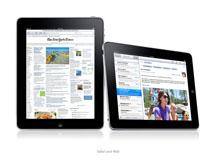Tech This Out
- Share
- Tweet
- Pin
- Share
Triumph of the Nerds, a 1996 PBS documentary, chronicles the personalization of computing, a movement led by Steve Jobs and his Apple II. Jobs has pioneered several other industries over the 30-plus years since the Apple II’s release in 1977, but his latest attempt might be his biggest challenge yet: personalizing the internet with the iPad.
“What is iPad?” Apple’s TV ad asks. “iPad is thin, iPad is beautiful, iPad goes anywhere and lasts all day.” What most tech experts will tell you, however, is exactly what many people thought when Jobs first introduced the new device: the iPad is just a giant iPod touch. For the most part they’re right. The iPad uses the same operating system and multi-touch interface as the iPod touch and the iPhone. It also has a strikingly similar design, with one notable exception: the iPad has a 9.7” screen, rather than the 3.5” display found on the smaller devices.
But the larger screen makes a world of difference. Safari (Apple’s web browser) on the iPad provides the best way to surf the web I have ever tried, whereas the same browser on the iPod touch is merely a convenient way to check email and the news. In the vast majority of cases, I would even rather use the iPad than a laptop, desktop, or netbook computer to go online. The reason, of course, isn’t that websites look any different on the iPad, but that the ability to touch, rather than click on, links makes the entire experience easier and more enjoyable. In this regard, Jobs has succeeded in personalizing the Internet.
Beyond the web, the iPad also excels with email, photos, video, calendars, maps, and just about anything else someone can design an app for.
In truth, it doesn’t really do any of these things (or the internet) better than any other computer can; the ability to touch, and thereby control more directly, any and all content simply makes the iPad more inviting than any other computer. Simplicity is the key to the whole idea; interacting with a computer through your finger is much simpler than doing so through a mouse, whether you’re an experienced hacker or a first-time user. And in today’s technological world, “simpler” is better, right?
Right, in most cases. But not all. One of the most prominent rumors circulating in the weeks prior to Jobs’ unveiling of the iPad was the idea that Apple was somehow going to save the struggling print media industry. Indeed, major newspapers like the Wall Street Journal and the New York Times have created apps for the iPad that deliver a daily virtual newspaper to the device, and Apple’s iBooks app serves as both an online bookstore and an e-reader similar to Amazon’s Kindle. But reading on a computer screen, as most everyone has come to realize over the last several years, is not nearly the same as reading from a printed page. Not to mention the fact that long periods of reading on the iPad aren’t very realistic due to the constant availability of distractions like Facebook and YouTube.
In the end, what amazes me most about the iPad is just how well it epitomizes the current movement in technology, one that tries to take every real, everyday experience and make a virtual representation of it that is as close to the real thing as possible. What amazes me most is that anyone would pay hundreds of dollars for a device that lets them read books and newspapers on a screen, when they could simply read a real book, or a real newspaper. That anyone would want to watch live video of a Packers game over the Internet, when they could simply go to the game in person. That anyone would choose to open up a stargazing app and hold their iPad up to the sky (or, more likely, the ceiling) when they could simply go outside and look up at the real night sky. In reality, the simplest, and thereby the most enjoyable, experiences in life are the real, not the virtual.
“It’s crazy powerful, it’s magical,” the iPad commercial continues. “It’s already a revolution, and it’s only just begun.”
But if that revolution is the culmination of the permeation of technology into every waking moment of our lives, if that revolution is the final act in this tragedy that tears our eyes away from our surroundings and forces them instead on a screen, then it is a revolution that I want no part of.


